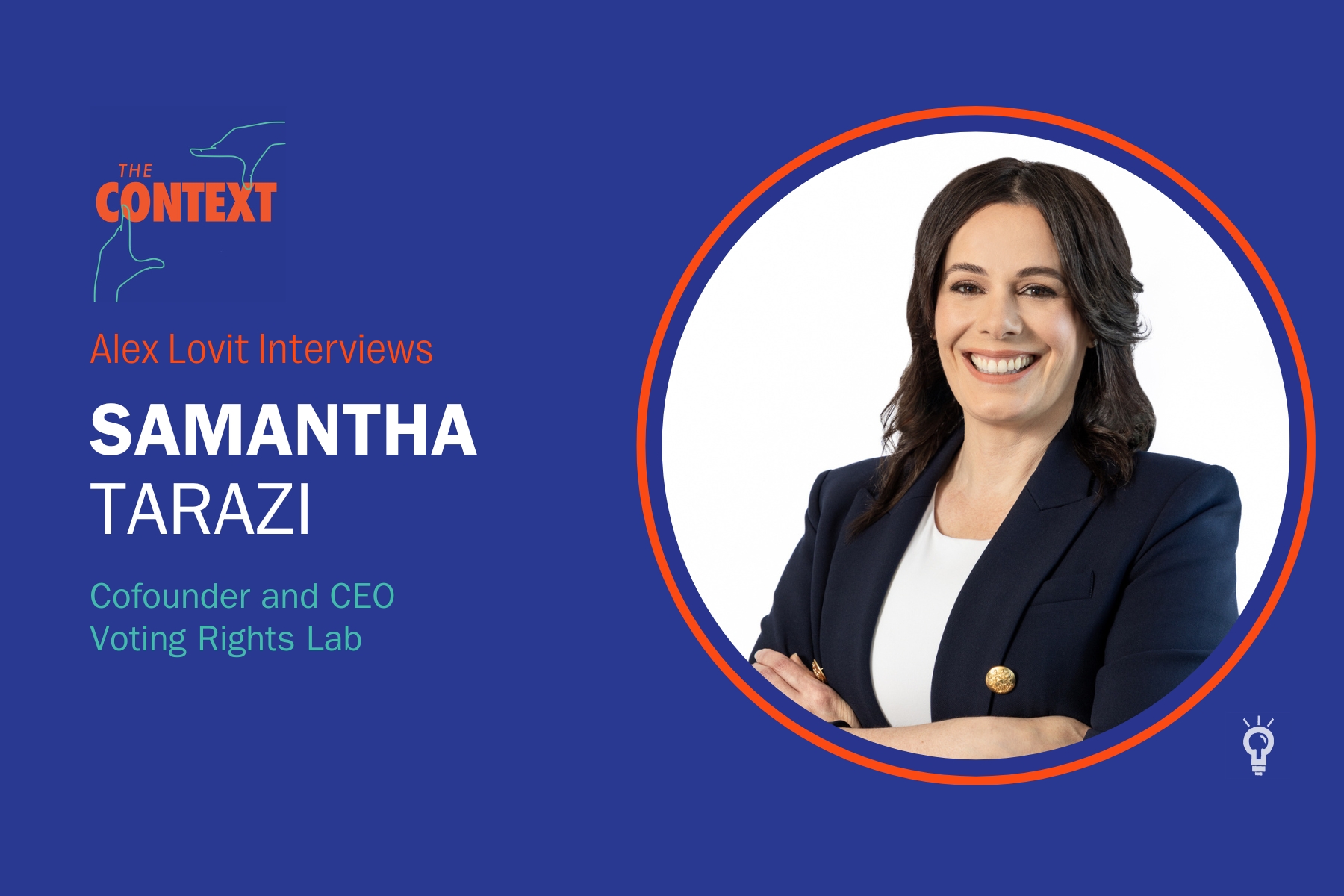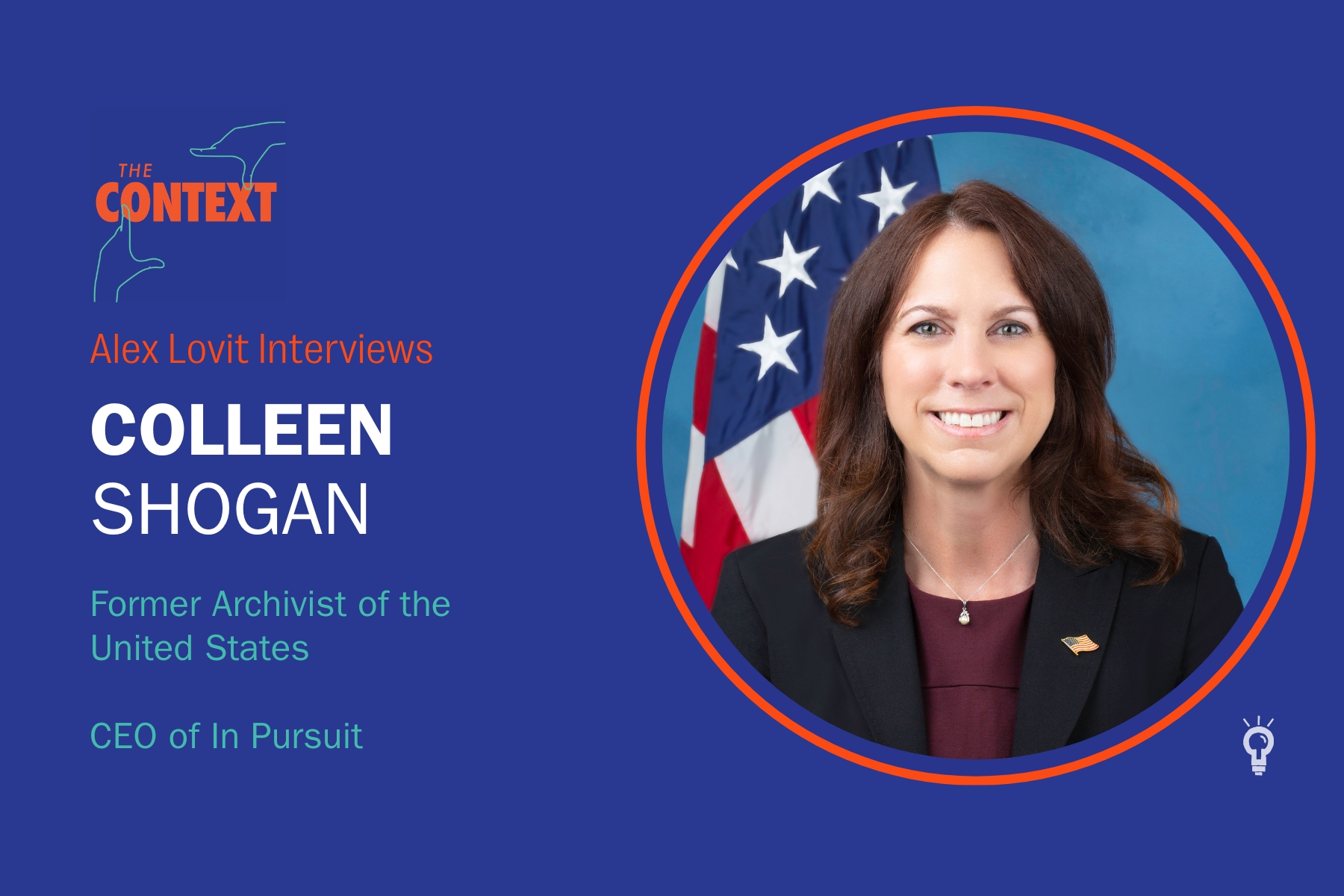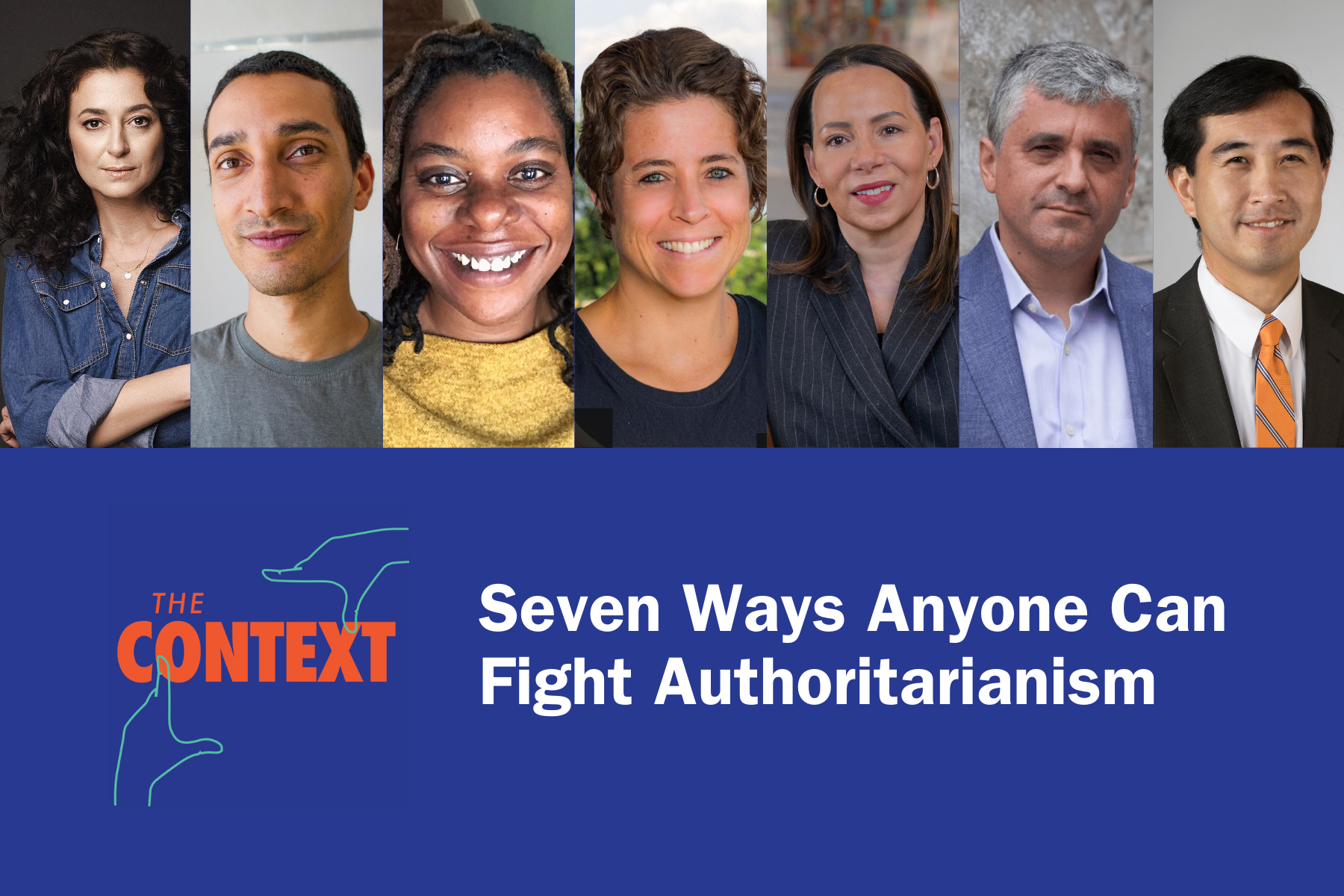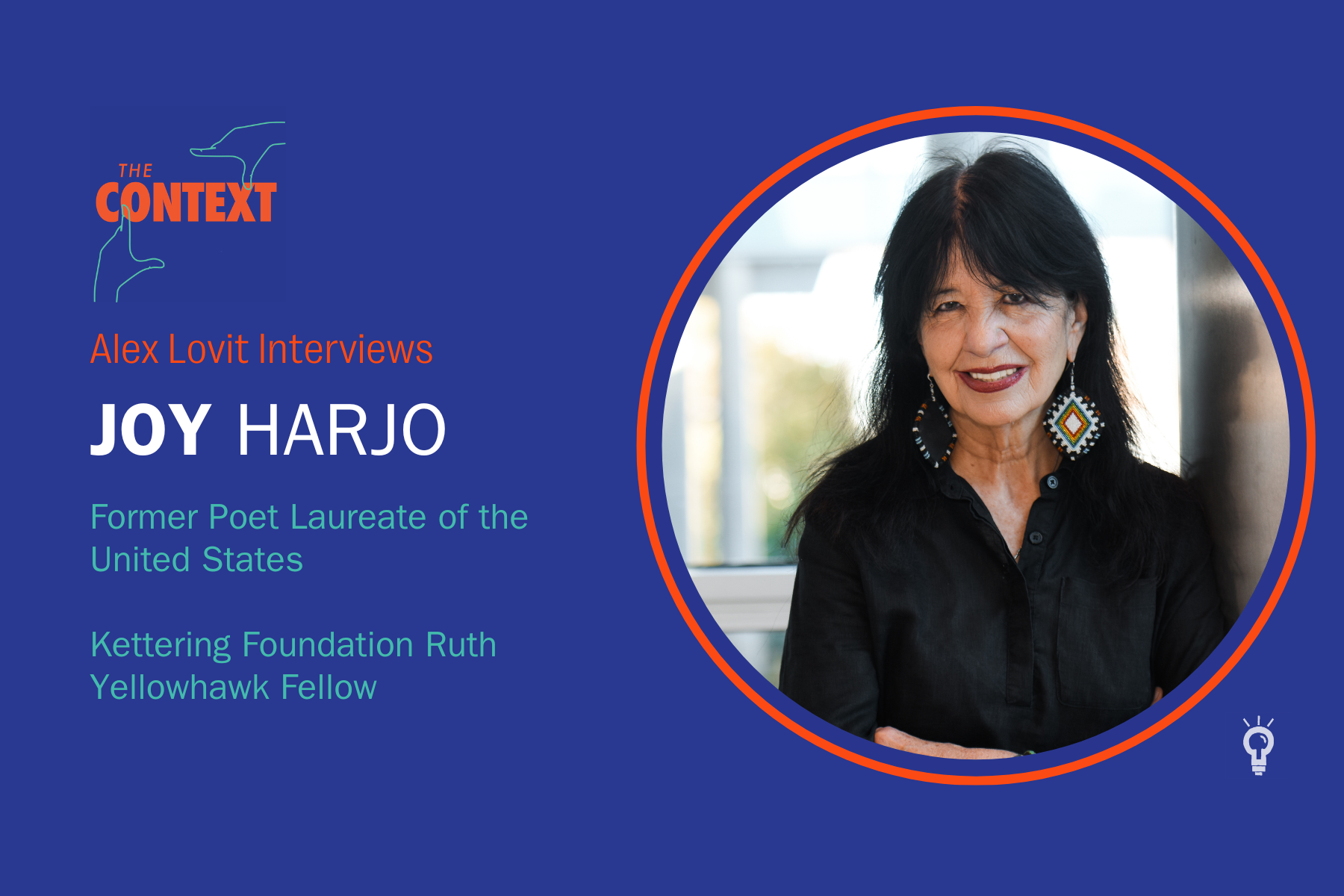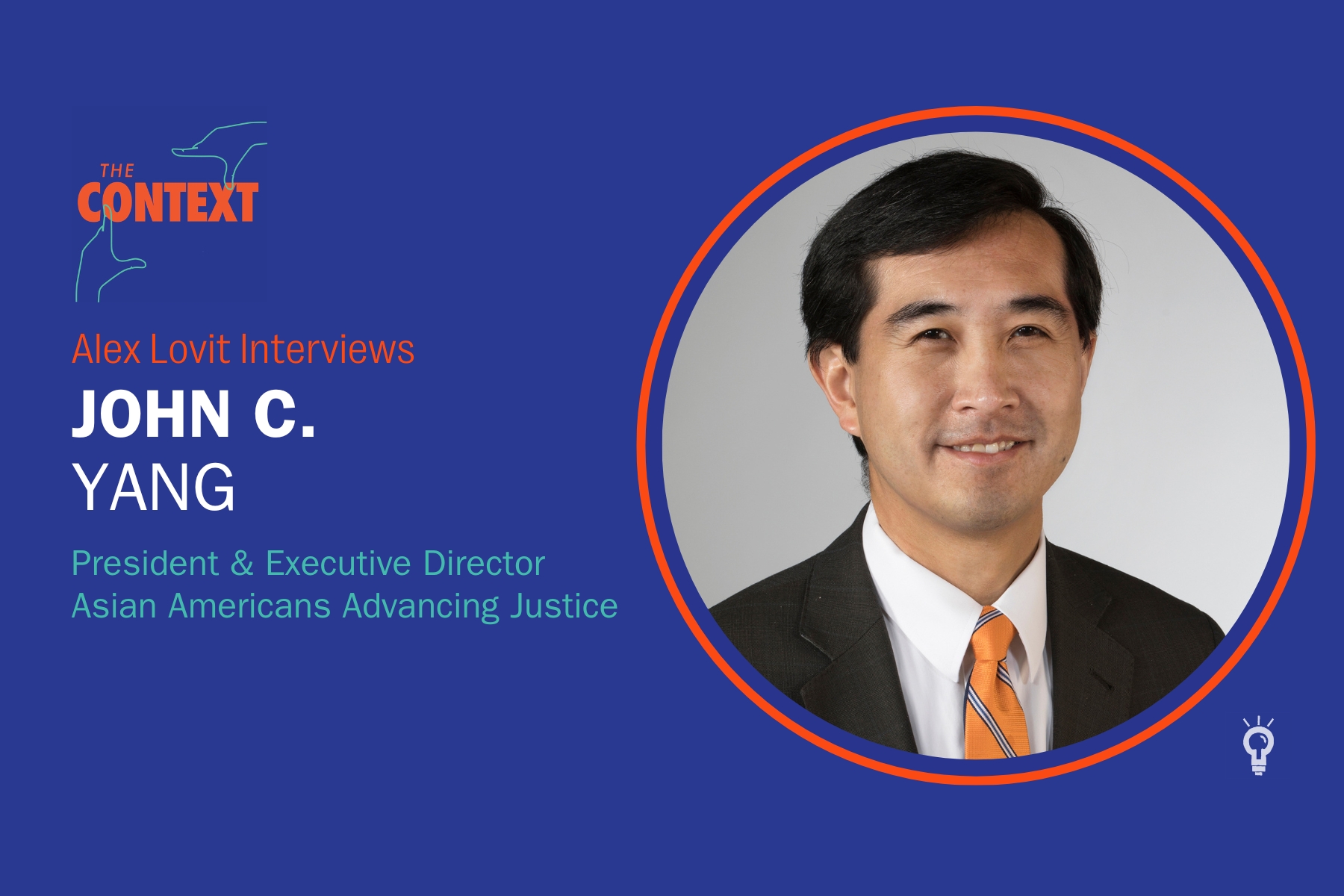Someone Has to Be Willing to Say “That’s Not Right”
US institutions are being pressured into compliance with the Trump administration’s capricious demands. Many law firms, philanthropic organizations, and higher education institutions are choosing the path of least resistance. But will it keep them safe?
Sharon L. Davies is the president and chief executive officer of the Charles F. Kettering Foundation. Davies’ career experiences span both academic and nonacademic fields. From 2017–2021, she was provost and senior vice president for academic affairs at Spelman College. She joined Spelman from The Ohio State University, where she was vice provost for diversity and inclusion and chief diversity officer. Davies was also a member of OSU’s Moritz College of Law faculty for 22 years, serving as the Gregory H. Williams Chair in Civil Rights and Civil Liberties. In addition, she directed the university’s Kirwan Institute for the Study of Race & Ethnicity.
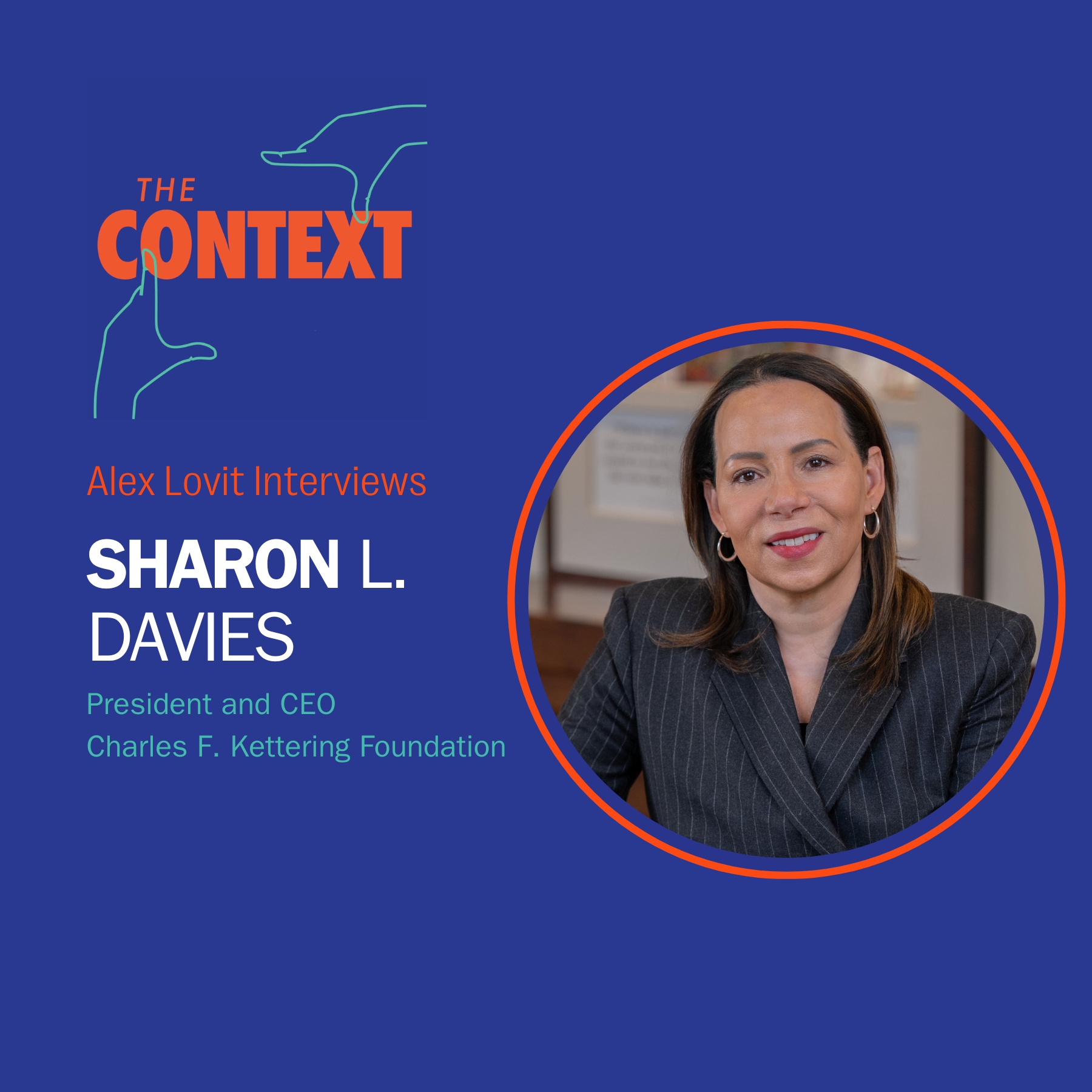
Share Episode
Someone Has to Be Willing to Say “That’s Not Right”
US institutions are being pressured into compliance with the Trump administration’s capricious demands. Many law firms, philanthropic organizations, and higher education institutions are choosing the path of least resistance. But will it keep them safe?
Sharon L. Davies is the president and chief executive officer of the Charles F. Kettering Foundation. Davies’ career experiences span both academic and nonacademic fields. From 2017–2021, she was provost and senior vice president for academic affairs at Spelman College. She joined Spelman from The Ohio State University, where she was vice provost for diversity and inclusion and chief diversity officer. Davies was also a member of OSU’s Moritz College of Law faculty for 22 years, serving as the Gregory H. Williams Chair in Civil Rights and Civil Liberties. In addition, she directed the university’s Kirwan Institute for the Study of Race & Ethnicity.

Share Episode
Someone Has to Be Willing to Say “That’s Not Right”
Listen & Subscribe
US institutions are being pressured into compliance with the Trump administration’s capricious demands. Many law firms, philanthropic organizations, and higher education institutions are choosing the path of least resistance. But will it keep them safe?
Sharon L. Davies is the president and chief executive officer of the Charles F. Kettering Foundation. Davies’ career experiences span both academic and nonacademic fields. From 2017–2021, she was provost and senior vice president for academic affairs at Spelman College. She joined Spelman from The Ohio State University, where she was vice provost for diversity and inclusion and chief diversity officer. Davies was also a member of OSU’s Moritz College of Law faculty for 22 years, serving as the Gregory H. Williams Chair in Civil Rights and Civil Liberties. In addition, she directed the university’s Kirwan Institute for the Study of Race & Ethnicity.
Alex Lovit: Democratic societies require free speech, freedom of inquiry, and the contest of ideas. That means we need institutions that are able to seek the truth and speak the truth without fear of political backlash. To state the obvious, that is not the situation many prominent institutions in the U.S. are in today. The Trump administration has been targeting institutions to change policies and practices both head-on and by creating a culture of fear. My guest today says that should set off alarm bells for the future of American democracy. You’re listening to The Context. It’s a podcast from the Charles F. Kettering Foundation about how to get democracy to work for everyone and why that’s so hard to do. I’m your host, Alex Lovett.
Today I’m speaking with Sharon L. Davies. She’s the president and CEO of the Kettering Foundation—and yes, that makes her my boss. Sharon has an informed perspective on what institutional leadership can and should look like in this challenging moment. Before she took the helm at Kettering three years ago, she was assistant U.S. attorney with the Southern District of New York, she taught law at the university level, and she served as a university administrator at Spelman College and The Ohio State University. We’re grateful she found the time to share her observations with us for the show. Sharon Davies, welcome to The Context.
Sharon Davies: Thanks, Alex. It’s really nice to be here with you.
Alex Lovit: So you’re a lawyer and you’ve spent a lot of your career working in higher education, and those are two institutions that Trump has been targeting in unprecedented ways. So, when you think about these two sectors—higher education and law—why do you think Trump is targeting them specifically?
Sharon Davies: Well, universities have an enormous role to play in a democracy, and if this is an administration that is not a friend of democracy—that would much rather be in control of governance the way that an authoritarian leader would exercise control—then what happens on university campuses is very important to them. The universities are one of the first things that are targeted by leaders who lean towards authoritarianism, and why is that? Because universities are sites of free inquiry. They are sites of critical thinking, and sometimes that critical thinking can be critical thinking about policies or practices of a presidency. Also, the universities are often the site of free speech and protests that could be leveled at a presidential administration.
So one of the things that authoritarian-leaning leaders do is try to clamp down on the speech and thinking that can happen—and even teaching that can happen on those campuses. That’s one of the most disturbing things that is happening right now in our country is the attack on free expression and academic freedom on our college campuses. It is one of the most frequent things that we see happening in an era of rising authoritarianism.
For law firms, law firms would be expected to be a part of the direct pushback against policies and executive orders that this administration is handing down, challenging the legality of those executive orders. If you could put law firms in fear of the administration, that may make them a lot less likely to be the ones who take those cases. I think we are in great debt to the lawyers who are willing to do that work because right now it’s hard to find glimmers of hope for a lot of folks in being able to push back against the policies of this administration and that tsunami of executive orders that are changing things or threatening to change things in dramatic ways in our democracy. So that is the role that we need law firms, and law offices, and lawyers to do in order to safeguard our democracy.
Alex Lovit: What are you noticing about how law firms and universities are responding to President Trump?
Sharon Davies: Yeah. So great question because the thing that troubles me the most, Alex, is this tendency to try to go it alone. I think the impulse of university leaders and law firm partners has been to try to negotiate a way out of disfavor with this president is ultimately not an effective strategy with the Trump administration. It almost assumes as though one day getting on his good side is going to provide them with protection in the future, and I think there’s a lot of reasons to doubt whether that is true. Case in point: Paul Weiss, one of the biggest, most prestigious law firms in New York City; Skadden Arps, one of the biggest international law firms that exist today. Both of these firms with huge resources were really brought to bend the knee to Donald Trump and were willing to pledge that they would in the future engage in millions of dollars of free work—pro-bono work—on issues that the president actually favored. So it’s not just working their way out of at present the difficulties they felt they were in with this president, but also pledging to do some work have caused at least some of their own associates and former partners and associates a lot of concern about their decision-making.
University presidents are in a very, very difficult spot because of the reliance by those institution on federal funding. That’s not true, by the way, when it came to the law firms. So law firms aren’t used to having a big part of their budgets depending on Washington, D.C., allocations. But those firms were able to be frightened by the threat that their lawyers would not be given security clearances, or their lawyers would not be allowed in federal buildings. That’s a pretty big threat—and I think is a threat that deserves our attention—because what this means is that we have a federal government, a president of the United States who is willing to use all of the power of the federal government against institutions and individuals in unprecedented ways.
Alex Lovit: You touched on this in your answer, but let me ask more directly. What is Trump asking? What is the demand that he is putting on law firms and universities, and what is the threat that he’s wielding?
Sharon Davies: Some of the biggest demands by this administration have had to do with DEI practices on these campuses. That would include diversity, equity and inclusion offices that exist to help to support the success of underrepresented students. So they have threatened their funding if those things don’t disappear. We see news reports of just entire offices being eradicated on these campuses and that work no longer being done. There are other things that are even more troubling than that, including pressure about what kinds of speech can happen on these college campuses.
For example, the administration has suggested that the protests that took place over the last year about the war between Israel and Gaza—that what university leaders allowed to happen on their campuses was antisemitic and that they did not sufficiently defend students and faculty from that antisemitism. So they are using that as the justification for encroaching on speech practices. All of that is incredibly controversial. I mean, none of us like to hear about antisemitism on college campuses, but neither should we be complacent about suggestions that speech can be restricted by the president of the United States or the president of a university for that matter.
Here’s the other thing that I also thought about when you were asking that question. It is that we know some things about what’s going on from the news reports and so on, but we don’t know everything that’s going on because it’s not all being reported about. I had a conversation with a president of a university who told me about one research grant that was pulled recently, and it was to fund research on facial recognition technology. There has been some studies that have shown that there’s a concern that facial recognition technology works well for people who are white, but not non-white people, and so the research that was going on—that was provided by this grant—was to study this problem and see if we can make it more reliable for all people. That research is now too controversial evidently for a university to do.
So even though we are reading about the Columbias, and the Johns Hopkins, and the Harvards, there is this work that is going on that is putting fear in the hearts of other university presidents who aren’t making headlines. But those are the kinds of things that are happening right now that I think the nation should be concerned about, and the implications of those kinds of aggressive attacks on our democracy.
Alex Lovit: For universities, that’s what the demand is and what the threat is. How about for law firms? What’s the demand and what’s the threat?
Sharon Davies: For law firms, it’s also whether there are DEI efforts that focus on increasing the diversity, the inclusiveness of those firms, but also some firms that have engaged in legal work that the administration is unhappy about. That would include work done by the firm Perkins Coie, for example, that focused on voting rights—or any of the legal work that implicated in one way or another Donald Trump when he was not in power between his two terms. So there were clearly a lot of lawyers who were situated at different firms who the president was unhappy about what they did with their law practices because it affected him. Now there is essentially revenge happening focusing on those firms that engaged in legal work that the president and his administration is not happy with.
One of those lawyers is a lawyer named Marc Elias. He does some of the most important work that is happening right now when it comes to challenging the constitutionality, the lawfulness of the executive orders coming out of this administration. That’s the kind of legal work that can put you on the wrong side of this administration. But what’s different is there always have been legal cases brought against administrations. That’s not new. But what is new is the sense that you could have acts of retribution against you if you engage in that kind of work.
Alex Lovit: So at this start of this conversation, you said you’ve been disappointed by how many of these institutions have been capitulating to Trump’s demands. Are these examples of effective resistance that you see? Or what would an effective resistance look like?
Sharon Davies: Yeah. Some of them actually come from our own senior fellows at the Kettering Foundation. So Neal Katyal has been one of the lawyers who has pushed back and brought a suit against the administration for firing practices that are happening as a result of the executive orders or as a result of the activities of Elon Musk. So we’re very proud of Neal and the other lawyers who are bringing those cases. If you look around the country, there’s already I think over 100 lawsuits that have been filed. An additional senior fellow of ours, Judge Michael Luttig, is doing important work along with other retired judges in creating friend of the court briefs—amicus briefs—in some of these cases to help to support the litigators who are pushing back.
That is actually a glimmer of hope for us that we continue to have the bar that the nation needs to make sure that the administration doesn’t just roll over institutions like our universities and others who are engaged in civil service, for example, whose jobs have been put in jeopardy by President Trump’s executive orders.
Alex Lovit: Let’s talk a little bit about history. There’s plenty of examples in American history of the United States not fully living up to its democratic promise. Do you see precedence for the current historical moment? Are there times in American history that you feel that there have been similar risks to democracy?
Sharon Davies: I think that we could look at the Nixon administration, actually, as a case in point. The whole Watergate scandal was the use of political power—governmental power—against political opponents. So it’s not unprecedented that a president would use the powers of his office to stay in power and to defeat opponents. What’s different is that there was a Congress that did not hesitate in doing its job in serving as a check on the power of the presidency. In addition to that, there was a court system that was willing to also hold the president accountable.
I’m a bit more concerned about how our currently composed United States Supreme Court will react when the cases that are moving toward that court ultimately get there on the merits and not the procedural issues that we’ve seen so far be handled by this court. Because we do need there to be a willingness on the part of the legislative branch and the judicial branch to do their jobs, to actually serve as a constitutional check on the power of the executive. We already know that congressional Republicans are not willing to do that with this president. It’s a failure of one of the biggest safeguards that we have in our democracy—that we don’t have a Congress that is willing to push back against the powers that this executive is using that seem to fall into their domain.
Alex Lovit: Well, let me ask about the institutions that we’ve been discussing: higher education and law firms and the judicial system generally. Do you see those institutions as having been part of the fight for American democracy throughout history? What roles have those institutions played in American history?
Sharon Davies: So, for example, during wartime, FDR signed an executive order that required Japanese Americans to be relocated to internment camps. That became a case that was fought and went all the way up to the United States Supreme Court—the Korematsu decision—and the United States Supreme Court fell down on the job at that time and I think now roundly it is regarded as one of the worst decisions in U.S. Supreme Court history. A lawyer had to bring that case. Somebody had to be willing to say, “That’s not right.” Even if the Supreme Court didn’t get it right at the time, we could still have it in American history for students later on to learn from, right?
So lawyers have always played a very important part in the development of our democracy and must be able to play that role in today’s society, as well. That’s why it’s very dangerous when, once they do that, they become a target of presidential power.
Alex Lovit: How about universities? How do you see universities as a part of American democracy throughout our history and today?
Sharon Davies: So universities have always been on the forefront of our most democratic movements. That was certainly a big role that college students played during the middle of the 20th century during the Civil Rights Era. College administrations haven’t always been thrilled about their students engaging in political activity like that. It wasn’t unusual for students to be discouraged actively from playing that role. But those college campuses were places where they were educated and sometimes inspired to be the ones who would put themselves on that line. That’s why I say that what is happening right now with respect to academic freedom and free expression on college campuses is a grave concern for our democracy.
I do think that students will continue to be the ones who will have the courage, quite frankly, to push back anyway. We are seeing that happen on our college campuses, but we also see that we have a government right now that is I think quite intentionally attempting to put students in fear of exercising their free speech rights. We have a government that is arresting students who are engaged in speech activities—and not just arresting them, moving them out of their communities into facilities that are out of state or even out of the country as a result of engaging in protests; the kinds of protests that we would expect to happen on college campuses when we have an administration that is moving so quickly and aggressively in ways that strike many people as unconstitutional.
Alex Lovit: So you were talking there about examples of bravery on the part of students who are standing up and protesting often at personal risk, as you were saying, especially international students. What does bravery look like for the institutions themselves?
Sharon Davies: I was encouraged by what I think of as a very courageous statement by the president of Princeton, who basically was saying that—that the right approach for universities right now was not to fall back and fall into line; it is to challenge what this administration is doing: using the power of government against a rightful role played by universities in a democracy.
Alex Lovit: How about the institution that you and I are a part of, the Charles F. Kettering Foundation? How do you see our role in defending democracy in this moment and defending embattled institutions?
Sharon Davies: That’s a question that I think about almost every hour of the day right now, Alex. The foundation world is being threatened, too, by this administration, and so we aren’t escaping the aggressive way that the Trump administration is using its power. The administration has already announced that it is investigating actively all foundations with endowments over $500 million. I think that the message is being given to the foundation world in the same way that a message is being given to law firms and a message is being given to universities—and that is: don’t use your resources in a way that displeases us or isn’t in alignment with what we think should happen in the United States.
This is a very dangerous moment, and also a moment of real responsibility by foundations doing the courageous thing that I have been talking about when it comes to university presidents or partners at law firms—and that is being willing to take a stand. When it comes to us at the Kettering Foundation, we’re a non-partisan foundation, but a foundation that has a mission of preserving and advancing democracy by nurturing citizen engagement, by promoting government accountability to the people, and by countering authoritarianism. It’s not possible for us to do that job without being engaged in work that pushes back on some of the actions of this administration. Although we’re not one of the foundations that is lucky enough to have an endowment over $500 million, we’re not far from it. But more importantly, we have a mission that actually requires us to be engaged in work that encourages citizens and institutions to push back against anything that would harm our democracy.
So that’s a responsibility that I take very serious. We will continue to engage in that work. That may mean in today’s world that there’s a target put on us. I take that really seriously as the president of this organization because I have colleagues that I have a responsibility to—you, and your family, and everybody else’s family of our colleagues here. So it weighs on me, but I also know that all of us feel a responsibility towards democracy and that we may be living at a moment when our democracy could actually fall. If we listen to another one of our senior fellows, Steve Levitsky, who writes brilliantly on this and is one of the foremost authorities about how democracies die, we are at a moment where we may be watching our democracy die without the right pushback against that.
So I think that to live up to our mission we really, seriously have to take the actions of this administration to heart and to do all that we can to make sure that we stand up to that possibility that our democracy may be at real threat.
Alex Lovit: So, as you were saying there, the stakes are high. Essentially existential for American democracy right now. We’ve been talking a lot about institutions—and institutions do play an important role in democracy, as I hope this conversation has demonstrated. But most of the people listening to this podcast don’t work for big law, they don’t work for an Ivy League institution, and they don’t work for the Charles F. Kettering Foundation. For citizens who are listening to this, what advice do you have? What role should they be playing to defend democracy right now? Should they be playing any role in helping to defend these institutions right now?
Sharon Davies: I love that question because one of the things that I’ve noticed recently—and pretty much in every room that I walk into, the question that I get so often right now is—from an everyday citizen, “What can I do about this? I’m concerned, but I feel powerless. What can I do?” I get that question over, and over, and over again. I have been thinking about history a lot, and the lessons of the history, and how powerful actually individual citizens are. We may not realize it, but most folks—you know, think about at a time like this, where are the leaders, right? Where is the Martin Luther King of our era? Because that example feels like the kind of powerful leadership that is required right now to meet the threat that were talking about. Btu in actuality, you and I both know that while MLK was an incredible leader, there were so many forces around him—individual citizens—that were equally, if not more important than Dr. King himself.
So all of us should think about what occurs to us as a very small thing to do, but to do something. I said to my son some years ago as concerns about our democracy were growing—I said to him—he’s in his twenties—”I don’t care what you do, honey, but you do need to do something. You can’t sit on the sidelines. Give it some thought.” He decided that he was going to be a poll worker. He’s played that role now in a number of elections. He’s one of the youngest people who are poll workers. You know, you go to cast your vote and you mostly see retired folks, but he’s in there, he’s in his twenties, and he’s decided that he would do that. It’s a small example of engagement.
Recently, there was a protest in cities around the country—the hands-off protests—where citizens of different communities decide that they would show up with their fellow citizens, many of whom—probably most of whom—they didn’t know and were strangers to them, wrote out their signs, and participated just in an active protest. That’s one example of what citizens are deciding that they can do to make their voice known and to help to protect a free society for as long as that society remains free to do that kind of thing.
Alex Lovit: Well, Sharon Davies, thank you for your bravery, your inspiration. Thanks for being a good boss, and thanks for joining me on The Context.
Sharon Davies: Thank you, Alex.
Alex Lovit: The Context is a production of the Charles F. Kettering Foundation. Our producers are George Drake., Jr., and Emily Vaughn. Melinda Gilmore is our director of communications. The rest of our team includes Jamaal Bell, Tayo Clyburn, Jasmine Olaore, and Darla Minnich. We’ll be back in two weeks with another conversation about democracy. In the meantime, visit our website, Kettering.org, to learn more about the foundation or to sign up for our newsletter. If you have comments for the show, you can reach us at TheContext@Kettering.org. If you like the show, leave us a rating or a review wherever you get your podcasts, or just tell a friend about us.
I’m Alex Lovett. I’m a senior program officer and historian here at Kettering. Thanks for listening. The views expressed during this program are critical to us having a productive dialogue, but they do not reflect the views or opinions of the Kettering Foundation. The foundation’s broadcast and related promotional activities should not be construed as an endorsement of its content. The foundation hereby disclaims liability to any party for direct, indirect, implied, punitive, special, incidental, or other consequential damages that may arise in connection with this broadcast, which is provided as-is and without warranties.
Transcripts are created on a rush deadline by a Kettering Foundation contractor and may contain small errors. The authoritative record is the audio recording.
More Episodes
- Published On: January 27, 2026
Latinos are the largest and fastest growing minority group in the United States, which means they have growing political influence. In recent...
- Published On: January 13, 2026
Free and fair elections are an essential component of democracy. But fair elections face a number of threats in the United States...
- Published On: December 30, 2025
Transparency is essential to hold democratic governments accountable. That requires preserving documents and making them accessible to the public. Colleen Shogan joins...
- Published On: December 16, 2025
We’ve gotten a ton of excellent advice from our guests this year about how everyday people can get involved in fighting authoritarianism...
- Published On: December 2, 2025
The news is full of stories of political crisis, and these stories are fed to us with speed and intensity through social...
- Published On: November 18, 2025
The Trump administration is trying to restrict who gets to be an American: who can be in the country, who has citizenship,...

